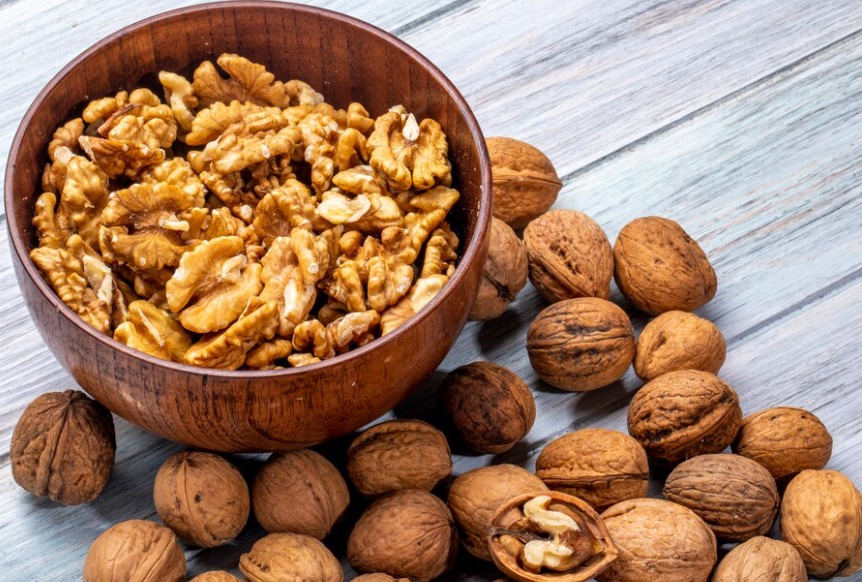In the world of nuts, walnut is well known because of its nutritional value and health benefits. With their unique taste, texture, and versatility, walnuts have earned their place as a popular nut. But beyond their delicious flavor, walnuts pack a powerful punch when it comes to enhancing our well-being. From heart health to brain function, let’s explore how incorporating walnuts into your diet can lead to a lot of health benefits.
Walnut: A nutrients Powerhouse
Walnuts are not only tasty but also incredibly nutritious. They are rich in essential nutrients that are vital for overall health. Just a handful of walnuts provides a good amount of:
Omega-3 Fatty Acids: Walnuts are one of the best plant-based sources of alpha-linolenic acid (ALA), a type of omega-3 fatty acid. These healthy fats are crucial for brain health, reducing inflammation, and supporting heart health.
Antioxidants: Walnuts are loaded with antioxidants, including polyphenols and vitamin E, which help combat oxidative stress and reduce the risk of chronic diseases like heart disease, cancer, and neurodegenerative disorders.
Protein: Walnuts contain a moderate amount of protein, making them a satisfying and nutritious snack option, especially for vegetarians and vegans looking to increase their protein intake.
Fiber: Fiber is essential for digestive health and helps promote satiety, making you feel full for longer periods. Walnuts are a good source of dietary fiber, which can aid in digestion and support weight management.
Vitamins and Minerals: Walnuts are rich in several vitamins and minerals, including magnesium, phosphorus, copper, and manganese, all of which play crucial roles in various bodily functions, such as bone health, energy metabolism, and immune function.
Promoting Heart Health:

One of the most well-researched benefits of walnuts is their ability to promote heart health. Incorporating walnuts into your diet may help lower your risk of heart disease in several ways:
Lowering Cholesterol Levels: The omega-3 fatty acids found in walnuts can help reduce LDL cholesterol (bad cholesterol) levels and increase HDL cholesterol (good cholesterol) levels, thus improving overall heart health.
Reducing Inflammation: Chronic inflammation is a significant risk factor for heart disease. The anti-inflammatory properties of walnuts, attributed to their omega-3 fatty acids and antioxidants, may help reduce inflammation and protect against cardiovascular problems.
Supporting Blood Pressure Management: Studies have shown that including walnuts in a balanced diet may help lower blood pressure levels, which is essential for maintaining heart health and reducing the risk of stroke and heart attack.
Boosting Brain Function:

In addition to benefiting the heart, walnuts are also known for their potential to support brain health and cognitive function. Here’s how walnuts may boost brain function:
Enhancing Cognitive Performance: The omega-3 fatty acids, antioxidants, and other nutrients found in walnuts have been linked to improved cognitive function and memory. Regular consumption of walnuts may help protect against age-related cognitive decline and neurodegenerative diseases like Alzheimer’s.
Improving Mood: Some research suggests that the omega-3 fatty acids in walnuts may have mood-stabilizing effects and could help alleviate symptoms of depression and anxiety. Including walnuts in your diet may contribute to overall mental well-being.
Protecting Brain Cells: The antioxidants in walnuts help protect brain cells from oxidative damage, which is believed to play a role in the development of neurodegenerative diseases. By reducing oxidative stress, walnuts may help preserve brain health and function.
Supporting Weight Management:

Despite being calorie-dense, walnuts can still be a valuable addition to a weight management plan when consumed in moderation. Here’s how walnuts can support weight loss and maintenance:
Promoting Satiety: The combination of protein, healthy fats, and fiber in walnuts helps increase feelings of fullness and satiety, which can prevent overeating and snacking between meals.
Balancing Blood Sugar Levels: Walnuts have a low glycemic index, meaning they have minimal impact on blood sugar levels. Including walnuts in meals or snacks can help stabilize blood sugar levels and prevent energy crashes, making it easier to stick to a healthy eating plan.
Providing Nutrient-Dense Calories: While walnuts are calorie-dense, they also offer a wide range of essential nutrients, making them a nutritious choice for those watching their weight. Incorporating walnuts into a balanced diet can help ensure you’re getting the nutrients your body needs without excessive calorie intake.
Delicious Ways to consume Walnuts:
There are countless delicious ways to enjoy walnuts. You can have walnuts with following to enhance taste:
Snack on them: Enjoy a handful of walnuts as a convenient and satisfying snack between meals.
Add them to salads: Sprinkle chopped walnuts over salads to add crunch and flavor, along with an extra dose of nutrients.
Include them in baked goods: Use chopped walnuts as a topping for oatmeal, yogurt, or cereal, or add them to baked goods like muffins, cookies, and bread for added texture and nutrition.
Blend them into smoothies: Add a handful of walnuts to your favorite smoothie recipe for a creamy texture and an extra nutritional boost.
Use them in savory dishes: Incorporate walnuts into savory dishes like stir-fries, pasta dishes, or grain-based salads for added protein and flavor.

